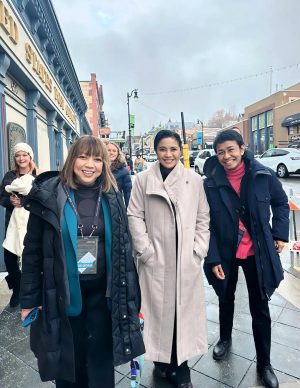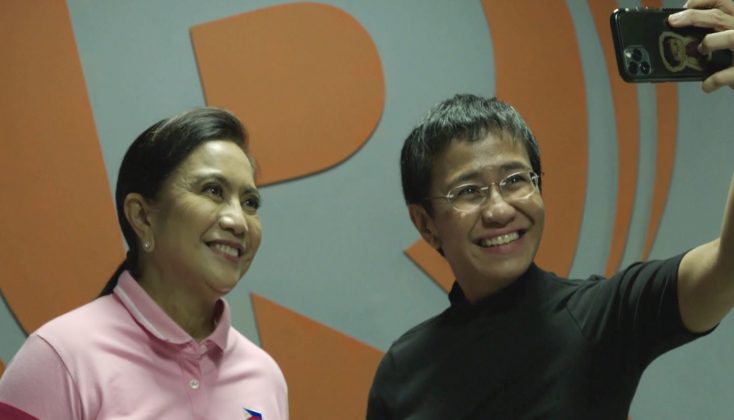
(l-r) Filmmaker Ramona Diaz, Leni Robredo and Maria Ressa of “And So It Begins” at Sundance. Film Festival.
By JANET SUSAN R. NEPALES
Special Contributor
HOLLYWOOD-Award-winning filmmaker Ramona Diaz and 2021 Nobel Peace Prize winner Maria Ressa took time off from their busy schedule at the Sundance Film Festival and shared more information with us on the making of their new documentary, “And So It Begins,” which follows the 2022 campaign of Vice President Leni Robredo for her run for office.
A companion piece to Diaz’s documentary “A Thousand Cuts,” Variety described the movie: “The film lays out the broad strokes of the country’s contemporary politics in the wake of strongman President Rodrigo Duterte, while capturing the groundswell of support for Robredo.”
In our exclusive interview via Zoom, the two trailblazers talked more about the film.
Congratulations on this new documentary Ramona and Maria at the Sundance Film Festival! I saw that you were in a panel dubbed the “Bad Ass Women of the Philippines.” How does each of you feel being called a “badass woman”? What does a “badass woman” mean to you?
Ramona: Am I badass? I don’t know. I just do my work. And I’ve been at it for a long time. So, I guess, getting it done is considered badass. Especially in this industry. You get it done and you’ve done something. So yeah, I accept. Slowly.
Maria: And similar, Janet. But for me, I think there’s generational. Language is liberating. If this had been 40 years ago, or 30, when did I become a journalist? I don’t know if that’s what a professional journalist would want to be called. But the information ecosystem has changed so much. Gen Z is very different from Boomer. I’m the end of the Boom, the in-between. Certainly, millennials are different, and then you have Generation Alpha coming up now. Also, that was a room full of people of color. Even that word. How do we define ourselves? I think everything is changing and the aggressiveness of that is both aspirational and also an acknowledgment of what we need to do to get things done.
And Ramona, why did you decide to make this documentary on Leni Robredo, “And So It Begins”? And please also explain your decision to change the title from “This is How it Ends” to “And So It Begins”?
Ramona: I’ll take you to the origin story of the film. When we rolled out “A Thousand Cuts” in 2020. It premiered here at Sundance in 2020. Then we had to roll out the film, during the pandemic, virtually. Maria and I did one of those virtual talks with you, right? So, we did a lot of that over 2020 and 2021, and people were always asking, “Well, how does it end? How does the film end?” Because, of course, we added the epilogue of Maria getting convicted for cyber libel. Everyone wanted to know that.
In the midst of that, in 2021, Raney Aronson, who was the executive producer of “A Thousand Cuts”, said, “Why don’t we do a follow-up of Maria? A one-hour follow-up of Maria let’s do that because people keep asking.” That was the intention.
I went back to the Philippines in 2021 to start shooting. We didn’t know if we could shoot an entire film because super lockdown. 14 days of quarantine, and social distancing. I had to house my crew. We had to be in a bubble, but that was not possible because we were shooting outside. It was complicated. But we started filming Maria again. We picked up where we left off when we could because it was still COVID. But as we were filming her, we also realized that all her concerns about the integrity of facts and integrity of elections and weaponized social media platforms were happening in front of our eyes because it was becoming clear that Leni was going to run, and BBM (Bongbong Marcos) was also going to run. It was then going to be this two-person race, although it’s a bigger field, obviously, in the Philippines, multi-parties, multi-candidates. We decided to incorporate that and I asked BBM if I could have access to her and her campaign. Then we found that it was this two-pronged film, right? Maria and Leni and the fight for disinformation, the role of vloggers, and the survival of journalism. All that meshed together at the time we were filming. So that’s how it was conceived and how it evolved into a bigger thing.
And why the change in title?
Ramona: You know, because, “This is How it Ends” came from people asking, how does it end? I said, okay, we’re going to just call it “This is How It Ends”. When I was making the film, I just felt like “This Is How It Ends” was too dark a title. It’s just too dark. So, we decided to lean on beginnings as opposed to endings.
Leni, in the film says, after she’s defeated, after the Thanksgiving rally, she says, “You can choose to see this as an ending, or you can choose to see this as a beginning.” So, I decided to lean into beginnings as opposed to endings. Because something dies, something is reborn, something begins. It’s more hopeful. To be hopeful is more useful during this time. It doesn’t help if we’re not hopeful.
Maria, I saw the photos of the thousands of people who participated and supported Leni in the campaign. Even my family members walked the streets. But still all this support seems to amount to nothing. Do you think the Philippine elections are capable of having honest and clean elections?
Maria: You can almost say the same thing about every election around the world in 2024. The debate here in the United States, for example. And the gerrymandering that is happening. Power has gotten more power to change and influence the vote in every country.
In our country; whew, that’s a tough question. Our generation, and younger, are learning that you need to go out of the virtual world. That we need to continue to demand better. Is it going to get better? It will depend on what we do. Because what’s happened with big tech is it allowed big power, geopolitical power to go to the cellular level of a democracy, which is every one of us on social media, and insidiously manipulate us.
Of course, Facebook. Meta, X did not mean to do that. They always say, “Well, that wasn’t our intention.” It doesn’t matter what their intention was. It is what it was. And for Leni Robredo to be targeted by disinformation, and to have these networks connect globally. The ones that attacked us; we found connections to Russian disinformation networks. That should not be allowed. That should be illegal. So, these are some of the things we’re fighting for.
To win the battle in the Philippines, we need to fight the battle outside the Philippines, that is not in our control, which is where I’ve spent a lot of energy the last few years. At the EU, I testified several times on the Democracy Action Plan, the Digital Services Act that rolled out last year.
Here in the United States, you have all of the movements. There are several groups that I’m working with to try to put boundaries around big tech. And Rappler continues to use generative AI. We were one of 10 groups that was chosen by OpenAI to work on how this large language model they have can be used for democratic consultations.
I didn’t really take you to the Philippines, no. Are we going to see an end to private armed groups? Are we going to see an end to corruption? Are we going to see an end to block voting, to feudal patronage? Probably not, but can it evolve to be better? Will we demand better? I think we must, and we can’t stop.
Ramona, I saw Leni Robredo at TOFA in New York, and she seemed very happy and contented with her foundation, Angat Buhay. What characteristics of Leni Robredo do you admire the most and why?
Ramona: I think with other politicians, you never know what you’re going to get. With VP Leni, what you see is what you get. You can believe that what she’s saying is the truth. In a way, she’s as unfiltered as any politician can be, which I think was what drew me to her.
Maria, congratulations on your book, “How to Stand Up to a Dictator”. I think you should make another book like, “How to Stop a Generation of Dictators”. (laughter) What book are you planning to write next?
Maria: I actually have to. It was a two-book deal that I had to come up with. We’re living through it right now. It’s like, trying to find a way forward.
What I liked about the Philippines was we did do something; we didn’t just sit there and get buffeted. We had facts first PH. 150 groups came together to try to restore facts at the center of our information ecosystem. And that was a model that worked and is now being replicated in other countries around the world. I think the big change, in my mind, and it was always there, it’s how journalism and community must go hand in hand.
We need to collaborate because we’re all on the news. We’re all on the same side, the side of facts. And we want to be able to move it forward. I think the last thing is, I’m normally, and especially when I’m on stage with Ramona, because she’ll emphasize the joy of the campaign, but then I’ll always remind her, yeah, but she lost. (laughs) So, where’s the joy for us?
It’s the excitement of literally creating what the future is going to become. That’s our challenge. And you are doing that by, it’s artists. When we were doing the mapping of the information ecosystem in the Philippines, the Tax First PH, four clusters came out. And one of the clusters is news, the people who cluster around the news. The second is art. The artists were all clustered together. The third was faith. And then the fourth were activists. So, I’m looking forward to understanding how we can fight the addictive, the attention economy, and how it’s tried to use our biology against us. Because we must. Otherwise, there’s no way forward. So that’s kind of exciting in its way.
Ramona, what do you hope this documentary will instill among Filipinos and the future generation?
Ramona: Oh, gosh, like I always say, I’m not prescriptive about what people come away with when I watch my films. Because it always depends on cultural context, the lens, how old you are, if you got up on the wrong side of the bed that morning and you’re watching my film alone, it’s so different. Or if you’re watching it in a big theater, I hope people watch it in a big theater. It’s meant to be seen in a big theater, as you saw with all the amazing shots of the crowds.
But what I’m finding out here at Sundance is that it resonates, of course, it resonates especially with Filipinos and Filipino-Americans. That can’t be helped. I think it will. But it also resonates beyond that because yesterday during the second screening, there were grown white women crying. Too overwhelmed to even speak to me. So, I know it’s touching something. It’s touching beyond that. So, there were the women, and then there, of course, the teenage Fil-Ams who were fangirling over Maria. I think it’s a combination, right? It’s a combination of audiences that I hope this will reach.
Is doing feature films also on your bucket list?
Ramona: It is in my future, Janet. Yes, it is. Yes, it is. But I’m finding filmmakers who can do both at the same time, like fiction and non-fiction. I can’t because the non-fiction space takes up all my energy. I find that I think I need to consciously, and intentionally do fiction and not try to do both at the same time. So yes, hopefully, my next one is fiction.





